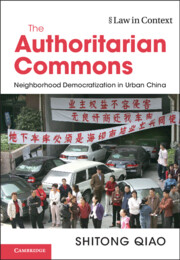Book contents
- The Authoritarian Commons
- Law in Context
- The Authoritarian Commons
- Copyright page
- Dedication
- Contents
- Figures
- Tables
- Acknowledgments
- Abbreviations
- Introduction
- Part I Theory
- 1 Defining the Authoritarian Commons
- 2 Neighborhood Democratization
- Part II A Tale of Three Cities
- Part III Benefits and Risks
- Conclusion
- Appendix I: Summary of Research Methods
- Appendix II: Survey Data and Analysis
- Notes
- Bibliography
- Index
2 - Neighborhood Democratization
from Part I - Theory
Published online by Cambridge University Press: 21 December 2024
- The Authoritarian Commons
- Law in Context
- The Authoritarian Commons
- Copyright page
- Dedication
- Contents
- Figures
- Tables
- Acknowledgments
- Abbreviations
- Introduction
- Part I Theory
- 1 Defining the Authoritarian Commons
- 2 Neighborhood Democratization
- Part II A Tale of Three Cities
- Part III Benefits and Risks
- Conclusion
- Appendix I: Summary of Research Methods
- Appendix II: Survey Data and Analysis
- Notes
- Bibliography
- Index
Summary
Neighborhood democratization refers to homeowners’ efforts to create a liberal commons in an authoritarian state, or, more specifically, their wresting of control over their neighborhoods through democratic elections from management companies and developers, whose neighborhood dominance local governments often acquiesce in for a variety of reasons. This chapter defines neighborhood democratization, identifies its challenges, and argues that the success or failure of neighborhood democratization depends on how the party-state balances its demand for effective governance and the risk posed by homeowner mobilization and association.
Keywords
- Type
- Chapter
- Information
- The Authoritarian CommonsNeighborhood Democratization in Urban China, pp. 12 - 24Publisher: Cambridge University PressPrint publication year: 2025

